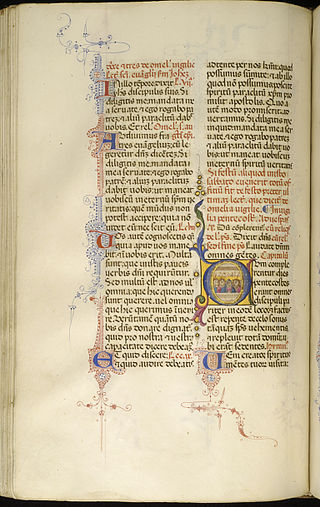
The Roman Breviary is a breviary of the Roman Rite in the Catholic Church. A liturgical book, it contains public or canonical prayers, hymns, the Psalms, readings, and notations for everyday use, especially by bishops, priests, and deacons in the Divine Office.
The deuterocanonical books, meaning "Of, pertaining to, or constituting a second canon," collectively known as the Deuterocanon (DC), are certain books and passages considered to be canonical books of the Old Testament by the Catholic Church, the Eastern Orthodox Church, the Oriental Orthodox Church, and the Church of the East. In contrast, modern Rabbinic Judaism and Protestants regard the DC as Apocrypha.

The Roman Missal is the title of several missals used in the celebration of the Roman Rite. Along with other liturgical books of the Roman Rite, the Roman Missal contains the texts and rubrics for the celebration of the most common liturgy and Mass of the Catholic Church.
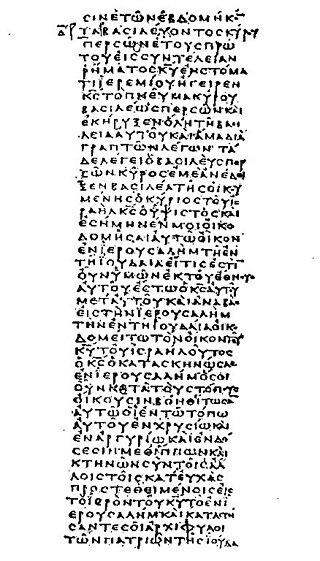
The Septuagint, sometimes referred to as the Greek Old Testament or The Translation of the Seventy, and often abbreviated as LXX, is the earliest extant Greek translation of the Hebrew Bible from the original Hebrew. The full Greek title derives from the story recorded in the Letter of Aristeas to Philocrates that "the laws of the Jews" were translated into the Greek language at the request of Ptolemy II Philadelphus by seventy-two Hebrew translators—six from each of the Twelve Tribes of Israel.

The Vulgate is a late-4th-century Latin translation of the Bible. It is largely the work of Jerome who, in 382, had been commissioned by Pope Damasus I to revise the Vetus Latina Gospels used by the Roman Church. Later, of his own initiative, Jerome extended this work of revision and translation to include most of the books of the Bible.
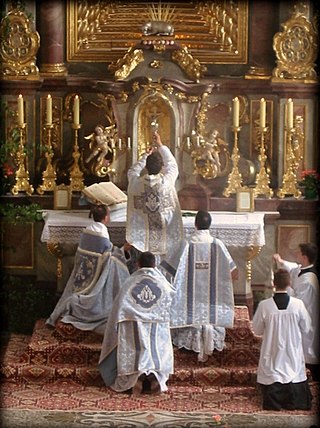
The Tridentine Mass, also known as the Traditional Latin Mass or the Traditional Rite, is the liturgy in the Roman Missal of the Catholic Church codified in 1570 and published thereafter with amendments up to 1962. Celebrated almost exclusively in Ecclesiastical Latin, it was the most widely used Eucharistic liturgy in the world from its issuance in 1570 until the introduction of the Mass of Paul VI.

The Bible has been translated into many languages from the biblical languages of Hebrew, Aramaic, and Greek. As of September 2023 all of the Bible has been translated into 736 languages, the New Testament has been translated into an additional 1,658 languages, and smaller portions of the Bible have been translated into 1,264 other languages according to Wycliffe Global Alliance. Thus, at least some portions of the Bible have been translated into 3,658 languages.

An acolyte is an assistant or follower assisting the celebrant in a religious service or procession. In many Christian denominations, an acolyte is anyone performing ceremonial duties such as lighting altar candles. In others, the term is used for one who has been inducted into a particular liturgical ministry, even when not performing those duties.
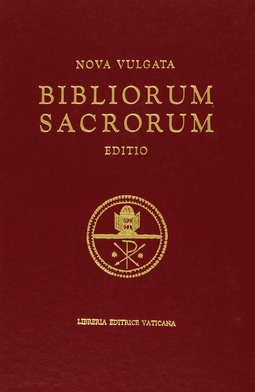
The Nova Vulgata, also called the Neo-Vulgate, is the Catholic Church's official Latin translation of the original-language texts of the Bible published by the Holy See. It was completed in 1979, and was promulgated the same year by John Paul II in Scripturarum thesaurus. A second, revised edition was published in 1986. It is the official Latin text of the Bible of the Catholic Church. The Nova Vulgata is also called the New Latin Vulgate or the New Vulgate.

Psalm 119 is the 119th psalm of the Book of Psalms, beginning in the English of the King James Version: "Blessed are the undefiled in the way, who walk in the law of the Lord". The Book of Psalms is in the third section of the Hebrew Bible, the Khetuvim, and a book of the Christian Old Testament. The psalm, which is anonymous, is referred to in Hebrew by its opening words, "Ashrei temimei derech". In Latin, it is known as "Beati inmaculati in via qui ambulant in lege Domini".
Ecclesia Dei is the document Pope John Paul II issued on 2 July 1988 in reaction to the Ecône consecrations, in which four priests of the Society of Saint Pius X were ordained as bishops despite an express prohibition by the Holy See. The consecrating bishop and the four priests consecrated were excommunicated. John Paul called for unity and established the Pontifical Commission Ecclesia Dei to foster a dialogue with those associated with the consecrations who hoped to maintain both loyalty to the papacy and their attachment to traditional liturgical forms.

The Liturgy of the Hours, Divine Office, or Opus Dei are a set of Catholic prayers comprising the canonical hours, often also referred to as the breviary, of the Latin Church. The Liturgy of the Hours forms the official set of prayers "marking the hours of each day and sanctifying the day with prayer." The term "Liturgy of the Hours" has been retroactively applied to the practices of saying the canonical hours in both the Christian East and West–particularly within the Latin liturgical rites–prior to the Second Vatican Council, and is the official term for the canonical hours promulgated for usage by the Latin Church in 1971. Before 1971, the official form for the Latin Church was the Breviarium Romanum, first published in 1568 with major editions through 1962.
The Pontifical Commission Ecclesia Dei was a commission of the Catholic Church established by Pope John Paul II's motu proprioEcclesia Dei of 2 July 1988 for the care of those former followers of Archbishop Marcel Lefebvre who broke with him as a result of his consecration of four priests of his Society of St. Pius X as bishops on 30 June 1988, an act that the Holy See deemed illicit and a schismatic act. It was also tasked with trying to return to full communion with the Holy See those traditionalist Catholics who are in a state of separation, of whom the Society of Saint Pius X (SSPX) is foremost, and of helping to satisfy just aspirations of people unconnected with these groups who want to keep alive the pre-1970 Roman Rite liturgy.
The Code of Canons of the Eastern Churches is the title of the 1990 work which is a codification of the common portions of the canon law for the 23 Eastern Catholic Churches in the Catholic Church. It is divided into 30 titles and has a total of 1546 canons. The code entered into force in 1991.
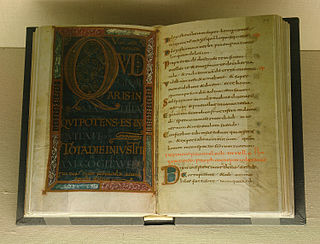
There exist a number of translations of the Book of Psalms into the Latin language. They are a resource used in the Liturgy of the Hours and other forms of the canonical hours in the Latin liturgical rites of the Catholic Church.
Quo primum is the incipit of an Apostolic constitution in the form of a papal bull issued by Pope Pius V on 14 July 1570. It promulgated the Roman Missal, and made its use obligatory throughout the Latin Church of the Catholic Church, except where there existed a different Mass liturgy of the Latin Church of at least two hundred years standing.
Summorum Pontificum is an apostolic letter of Pope Benedict XVI, issued in July 2007. This letter specifies the circumstances in which priests of the Latin Church could celebrate Mass according to what Benedict XVI called the "Missal promulgated by Blessed John XXIII in 1962" and administer most of the sacraments in the form used before the liturgical reforms that followed the Second Vatican Council.
The Old Testament is the first section of the two-part Christian biblical canon; the second section is the New Testament. The Old Testament includes the books of the Hebrew Bible (Tanakh) or protocanon, and in various Christian denominations also includes deuterocanonical books. Orthodox Christians, Catholics and Protestants use different canons, which differ with respect to the texts that are included in the Old Testament.

The Bible translations into Latin date back to classical antiquity.
Traditionis custodes is an apostolic letter issued motu proprio by Pope Francis, promulgated on 16 July 2021 regarding the continued use of pre-Vatican II rites. It restricts the celebration of the Tridentine Mass of the Roman Rite, sometimes colloquially called the "Latin Mass" or the "Traditional Latin Mass". The apostolic letter was accompanied by an ecclesiastical letter to the Catholic bishops of the world.












